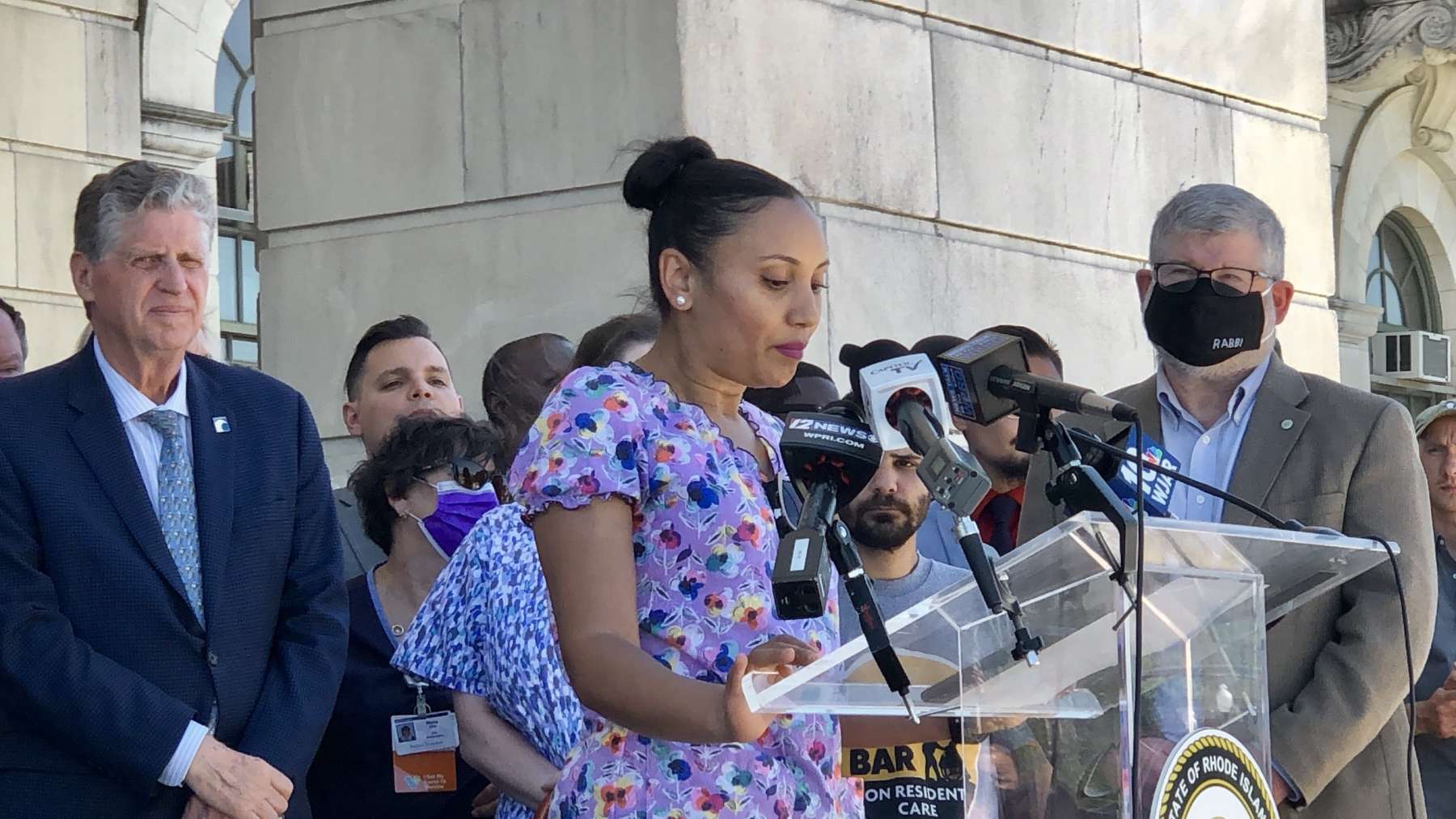After long battle, Nursing Home Staffing and Quality Care Act becomes law
Previous to the mandated 3.8 hours, there was no specific number in place regarding patient care, said Adelina Ramos, a CNA at Greenville Nursing Center who works with seniors in a dementia unit. “So if they feel like giving you 15 residents a day, you have 15 residents an day and altogether you could have 40 minutes a day per resident. You have to rush through the day to get that many residents done, and you only have an eight hour shift.”
May 28, 2021, 11:34 am
By Steve Ahlquist
Rhode Island Governor Daniel McKee overcame initial concerns and signed the Nursing Home Staffing and Quality Care Act (S0002A, H5012Aaa) on Thursday, which sets minimum staffing levels for Rhode Island nursing homes. Signing this legislation into law marks the end of a successful three year battle to more properly compensate direct caregivers and to allow them to deliver the kind of care nursing home residents deserve. The bill was given little serious attention by former Speaker of the House Nicholas Mattiello, who blocked the bill’s passage twice before being voted out of office.
The most recent time the bill was blocked was a year ago, during a pandemic that claimed the lives of well over a thousand nursing home resident and workers. Instead, the House opted for a nonsensical study commission. In reaction to Speaker Mattiello, the caregiver’s union, SEIU-1199 helped lead the successful campaign to oust Speaker Mattiello. Meanwhile, the Rhode Island Health Care Association (RICHA), the for profit nursing home owners trade association, spent over $70,000 to try to re-elect Mattiello including over $38,000 in direct campaign contributions. In addition to ousting a sitting Speaker, SEIU 1199 NE helped elect State Representatives Brandon Potter (Democrat, District 16, Cranston) and Leonela Felix (Democrat, District 61, Pawtucket). Both were present at the bill signing on Thursday.
New House Speaker Joseph Shekarchi (Democrat, District 23, Warwick) seemingly disinclined to repeat Mattiello’s mistake, supported the bill this year.

The new law, says Adelina Ramos, a CNA at Greenville Nursing Center who works with seniors in a dementia unit, “means we get more time with our patients – especially since I work in the dementia unit and basically have to rush through the care for our residents. So this means we can take more time with our residents and do more activities with them.”
The bill is also good in that caregivers will no longer “stress out” said Ramos.
Previous to the mandated 3.8 hours, there was no specific number in place regarding patient care, said Ramos. “So if they feel like giving you 15 residents a day, you have 15 residents an day and altogether you could have 40 minutes a day per resident. You have to rush through the day to get that many residents done, and you only have an eight hour shift.”
Adelina Ramos was recently featured in People Magazine.
Ramos introduced the Governor at the signing event. (Strong winds messed with the audio):
Here are the politicians speaking (again the wind was too fierce for quality audio):
SEIU-1199 released more info on the bill:
- For years, nursing home caregivers, resident family members and advocates have been speaking out about the need to raise staffing standards in Rhode Island nursing homes – long before COVID-19. Recent research finds that three-fourths of the nation’s nursing homes failed to meet federal staffing expectations for registered nurse staffing prior to the pandemic. Rhode Island ranked 40th in the country (Q4 of 2020 CMS) data for the average number of hours nursing home residents receive and last in New England. That’s why Raise the Bar on Resident Care launched its campaign almost two years ago to raise nursing home care standards.
- The legislation will bring Rhode Island in line with Massachusetts for one of the best staffing standards in New England in 2022 and will phase into a standard in 2023 that will make Rhode Island a national leader for staffing standards for nursing home residents. Moreover, the legislation will put historically underpaid nursing home workers who are overwhelmingly women and disproportionately people of color on a path to a living wage by guaranteeing future Medicaid investments are directed towards wages.
- The starting wage for Rhode Island nursing assistants is just $12.34 or $23,693 a year. This wage falls far short of the estimated annual pre-tax earnings of $66,057 required to meet the basic needs of a single parent family in Rhode Island. By raising wages, this legislation will allow nursing homes to better recruit and retain qualified caregivers.
Uprise RI has been covering this and related issues for many years. Here are some of those stories:
- Report: Inadequate staffing levels and low caregiver wages magnified nursing home crisis
- New report details intensifying staffing crisis in Rhode Island nursing homes
- Nursing home resident and caregiver COVID-19 deaths surpassed 1,000 this week
- Healthcare workers union delivers results in key Election Day victories
- As General Assembly convenes, nursing home workers rally for safe staffing and fair wages
- Bannister Nursing Home supporters and caregivers hold march for safe staffing and fair wages
- Bannister Nursing Home caregivers begin 3-day strike to demand safe staffing and better wages
- Elected officials and community groups out in support of ready to strike nursing home workers
- Two more nursing homes announce strike deadlines amid National Strike for Black Lives
- Safe staffing bill killed by House leadership; Strike pending at nursing homes
- Demand an end to the lethal status quo in nursing homes
- Governor Raimondo intervenes ahead of nursing home strike; commits to fair resolution of safe staffing issue
- Caregivers, family and community members hold memorial service for nursing home victims of Covid
- Nursing home caregivers rally at State House for safe staffing and fair pay
- Caregivers vote to strike at three nursing homes for safe staffing and better working conditions
- RI nursing home caregivers rally at State House to urge immediate passage of safe staffing legislation
- Raise the Bar calls on RI nursing home industry to invest its millions in profit in frontline caregivers and residents amid pandemic
- Caregivers picket in Pawtucket for better staffing and a living wage
- Demanding Dignity: Caregivers for people living with intellectual and developmental disabilities need a living wage
- Healthcare workers caravan outside DOH, calling for increased testing, greater nursing home accountability
- Charlesgate Nursing Center workers win $10/hour hazard pay; Caravan turns to Dept of Health
- Front line workers demand Bannister Center provide hazard pay, PPE and safe staffing
- Frontline workers hold “emergency caravan” for hazard pay, PPE and safe staffing
- Aletha Browne on the lack of pay, staffing and PPE she endures as a CNA during the COVID-19 pandemic
- Hundreds rally at State House to support The Nursing Home Staffing and Quality Care Act






